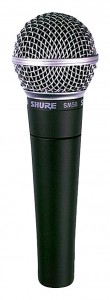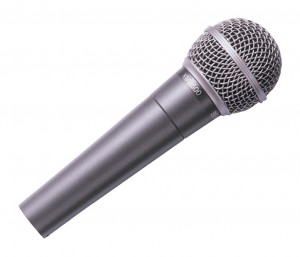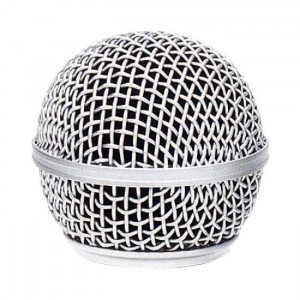The Best Microphone for Live Vocals on a Budget
Over the course of the last several decades, the Shure SM58 has become the de-facto standard vocal microphone for live performances. And for good reason: it’s built tough, reasonably priced, and generally sounds great on just about any voice. With a price tag of around $100, the SM58 may still seem out of the price range of some musicians, tempting them to look for other cheaper alternatives. But in the remainder of this article, I’ll attempt to persuade such frugal buyers to think twice before compromising, and why you should definitely buy the SM58 if you are able.
Sound & Versatility
The SM58 has a frequency response that is optimized for vocals. It cuts out extreme lows (“low-end rumble”) and adds a noticeable rise in the upper midrange (sometimes called “presence peak”). This tailored response adds warmth and clarity to voices, and gives a generally pleasing sound on most any voice. And while it’s true that some mics may sound better than others on certain sources or voices, the SM58 will give you a passable sound on just about any voice. This makes it a very versatile mic, particularly if it’s going to be used for multiple singers (e.g., different singers in the same band, or at a live venue where multiple bands will be taking the stage).
In my quest for a budget alternative, I tried the Behringer XM8500 (notice the “5” and “8” in the model number). First off, when you see a picture of what the XM8500 is supposed to look like on most vendor websites, it looks just like an SM58, with the charcoal body and silver grille. However, when you actually buy one of these mics, the grille is not silver. It’s charcoal-colored, just like the body of the mic. I don’t know what’s up with the discrepancy between the pictures and the actual mics, but if you think you’re getting a mic that will look just like an SM58, think again. Aesthetics aside, the XM8500 is a generally decent mic, but compared to the SM58, it’s boomier in the bass frequencies and lacks some of the upper midrange presence. In my experience, it also didn’t seem to handle really loud voices as gracefully as the SM58 does. The SM58 comes out as the winner hands-down compared to this mic.
Consistency
Unlike many budget microphones, the SM58 is built to stringent standards. Shure has a reputation to keep, and they’re serious about it. For this reason, Shure employs strict quality control standards, meaning strict component selection and testing. This not only helps to ensure their mics are high-quality, but it also means the sound produced by each mic is consistent. So you can mix and match SM58’s and not worry about having a dud. Consistency is not necessarily the case with many budget brands–after all, they’re known for being low cost, not necessarily high quality. The manufacturing of budget mics is often outsourced to factories where quality control and component selection are not a top priority. In fact, in a scenario like this, the manufacturer’s goal is to maximize profit, which means means quality can be compromised and consistency sacrificed on the altar of producing the mic at the lowest possible cost.
Quality vs. Quantity
Some guys might argue, “yeah, but I can get three of this mic for the price of one of that mic. I can use one for vocals, one for my guitar amp, and one for my snare drum.”. My question to that argument is this: do you really need three mics? I’ve been playing live music for over 30 years, and in the vast majority (probably > 90%) of venues, vocals were the only thing that really needed to be amplified through the PA system. In most small to medium-sized venues, acoustic drums, bass, and electric guitar amps are more than loud enough on their own, without any help from the PA system. So if you’re in need of a vocal mic, choose quality instead of quantity. Those “extra mics” you could get by buying cheap would probably never really see much use anyway.
Durability
I bought my first SM58 around twenty years ago. I bought it used, so I really don’t know how old it is. It could be as old as thirty. It has survived a flood (it was fully immersed in water) and being dropped on a stage or floor dozens of times. It still works great today. I have replaced the grille once or twice, though, when the dents became too much for me to look at.
You’ll Never Outgrow It
Never have I thought to myself, “I need a better mic for live vocals. That SM58 just isn’t cutting it anymore. It just doesn’t provide the sound I’m looking for.” To the contrary, I’ve purchased numerous other mics over the years, looking for a cheaper alternative to the SM58. There were few that seemed impressive at first, but when I compared them to the SM58, they always came up lacking. They didn’t sound as good, were more prone to feedback, or seemed cheaply-built, which led me to believe they probably wouldn’t last.
Feedback Rejection
After reading many glowing reviews on Amazon for the Pyle PDMIC58 (a popular SM58 clone), I had the chance to audition it side-by-side with a genuine SM58 through a church’s sound system. On the same singer’s voice, the Pyle mic seemed overly bright, shrill, lacking in body, and it was much more prone to feedback. I was ringing the feedback out of the system, and at the same approximate gain levels, the Pyle was howling like a wolf, while the SM58 was dead quiet. If the church’s stage had been outfitted with all SM58’s, I don’t think they would have had any trouble with feedback when running the system at a normal volume for the room.
Comfort
The simple, elegant design of the SM58 is a thing of beauty. The size and shape of the mic fits comfortably into just about any size hand, and a singer can easily hold onto it for even the longest of sets. This is not necessarily the case with all vocal mics which can be too heavy, too light, or awkward/uncomfortable to hold for long periods of time.
Conclusion
The Shure SM58 has become the undisputed king of live vocals mics. There are many cheaper alternatives, but if there’s any way possible that you can afford it, you should. The SM58 is built tough, reasonably priced, and generally sounds great on just about any voice. Considering its proven track record, it’s a bargain at around $100 or less.
Shop for the SM58 at ZZounds.com.
 November 29, 2015
|
Posted by Jon (admin)
November 29, 2015
|
Posted by Jon (admin)



 Categories:
Categories:  Tags:
Tags: 